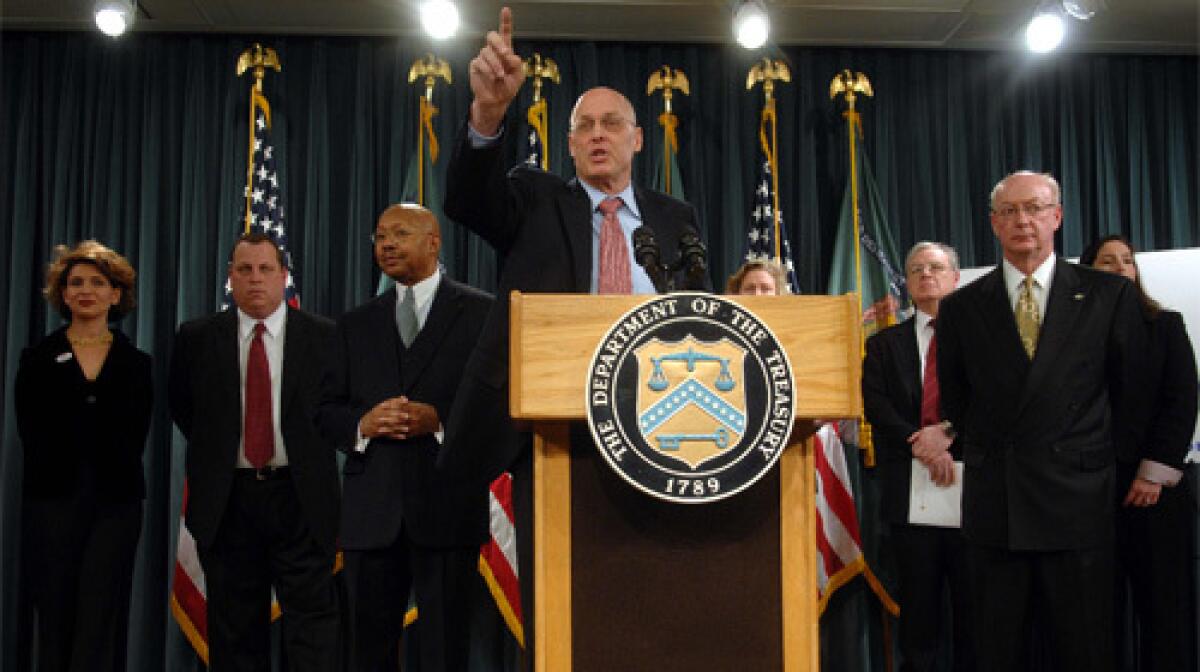Lenders offer help to avoid foreclosure

- Share via
WASHINGTON — Amid mounting foreclosures, a group of major lenders Tuesday said they would offer seriously delinquent borrowers a grace period of up to 30 days to establish possible workout plans before finalizing steps to take away their homes.
The initiative, announced by Bush administration officials and the Hope Now industry alliance, is an attempt by lenders to jump-start communications with borrowers who have been out of touch and are heading toward foreclosure. The lenders, including Countrywide Financial Corp. and Bank of America, said they would target their efforts at borrowers who are 90 or more days delinquent.
“Our hope is that today’s announcement will reach them, and they will reach out immediately for help,” said Treasury Secretary Henry M. Paulson Jr. who was joined by Housing and Urban Development Secretary Alphonso Jackson and a Bank of America executive for the announcement.
The lending companies refrained from guaranteeing help to any broad categories of borrowers, pledging instead to consider workout strategies on a case-by-case basis.
“None of these efforts are the silver bullet that will undo the excesses of past years,” said Paulson, in a reference to those who bought homes without sufficient income to make payments for the long haul, and to the lenders who gave them mortgages.
The new effort, dubbed Project Lifeline, was instantly derided by consumer advocates as too little too late while it was hailed by a major industry group as a significant step forward in protecting delinquent borrowers from foreclosure. This dispute underscored questions about the type of borrowers headed for foreclosure.
Most such borrowers have not responded to mailings from Hope Now, raising the possibility that a percentage of them are walking away from their loans because their homes have fallen in value and are worth less than the mortgage on the property.
Reaching delinquent borrowers “is the biggest problem we face in avoiding preventable foreclosures,” said Floyd Robinson, president of Bank of America’s Consumer Real Estate and Insurance Services Group.
Lenders on Tuesday declined to estimate how many borrowers might be helped by the initiative or to generalize on the types of steps that might be taken to ease their debt burdens.
By some estimates, close to 2 million borrowers face the potential loss of their homes in the next two years, in many cases sparked by steep payment hikes that are scheduled to take effect soon. These include borrowers who have fallen on hard times, speculators, victims of deceptive loan pitches and people who simply mismanaged their personal finances.
Robinson urged those who get notices about Project Lifeline to call their loan company within 10 days to make clear that they want to keep the home and are ready to get financial counseling.
“We believe that for some homeowners, that extra time will make the difference to allow them to avoid foreclosure,” he said.
Other lending companies taking part in the new effort include Wells Fargo & Co., Washington Mutual Inc., JPMorgan Chase & Co. and Citigroup Inc.
The initiative will apply to all borrowers, including those with prime loans as well as those with sub-prime loans marketed to people with weak credit histories.
Recent efforts by loan companies to contact delinquent borrowers highlight the challenge of starting the dialogue. Just 16% of borrowers responded late last year to mass mailings by Hope Now mortgage-billing companies -- and that was significantly higher than the usual response, lenders said.
Larry Rosenthal, executive director of UC Berkeley’s Program on Housing and Urban Policy, pointed Tuesday to three major categories of borrowers who don’t respond to mailings: people who have decided to walk away from their debts, those in self-denial about the extent of their problems and people who may already be seeking help with their finances.
“We don’t know the relative sizes of these groups,” he said.
Maude Hurd, president of the Assn. of Community Organizations for Reform Now, an advocacy group, termed the proposed 30-day pause a “welcomed small step,” but said it came far short of needed, long-term modifications to ease people’s debt burdens.
“A 30-day stay without significant loan modifications is icing with no cake,” she said. “Nothing short of hundreds of thousands of modifications to sub-prime and nontraditional mortgages can prevent the foreclosure crisis from worsening in the coming years.”
But a major industry group applauded the announcement as a way to address the problem of rising foreclosures: “This is another way that lenders are stepping up to help keep delinquent borrowers in their homes whenever possible,” said Kieran P. Quinn, a certified mortgage banker and chairman of the Mortgage Bankers Assn.
“One of the greatest challenges loan servicers face is convincing distressed borrowers that there is help available. Today’s announcement, coupled with the letters that participants will send out, should help encourage delinquent borrowers to reach out to their servicer for help.”
jonathan.peterson @latimes.com
More to Read
Inside the business of entertainment
The Wide Shot brings you news, analysis and insights on everything from streaming wars to production — and what it all means for the future.
You may occasionally receive promotional content from the Los Angeles Times.










